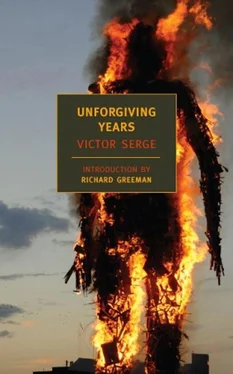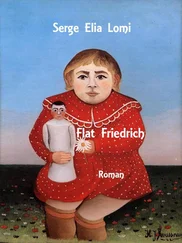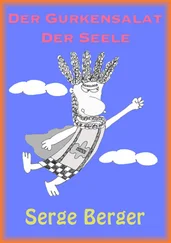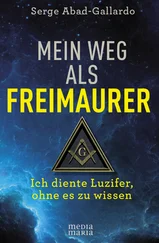After withdrawing briefly from politics, Serge accepts a Comintern assignment in Germany where the promise of a new revolution poses a last hope for saving the isolated Russian Soviets from smothering under increasing bureaucratic dictatorship. In Berlin Serge serves the Comintern both as a journalist and under various identities, as a militant or “agent” (in those days there was little distinction). Under the signature “R. Albert,” he sends reports to the world Communist press on galloping inflation, mass unemployment, mutilated veterans begging, strikes, and abortive putsches
. [7] 7. I first identified “R. Albert” as Serge’s pseudonym in the archives of Inprokorr on the basis of his style. These articles have been collected and translated by my colleague/comrade Ian Birchall in Witness to the German Revolution (London: Redwords, 1997).
Serge’s familiarity with the world of secret agents and with the desperation of the German people living through the post–World War I crisis helped him re-create the atmosphere of Berlin at the end of World War II in the third movement of
Unforgiving Years.
In March 1923, the German Communists are outlawed after the fiasco of their aborted Hamburg putsch, and Serge flees with his family to Vienna, where he works with Georg Lukács and Antonio Gramsci. In 1925, despairing of a renewal of revolution in the West, Serge makes the insanely idealistic decision to return to Russia and join in the last-ditch fight against Stalin as a member of the doomed Left Opposition led by Trotsky. Expelled from the Party in 1928, Serge turns to writing. In quick succession he produces three novels and a well-documented history ( Year One of the Russian Revolution ) and publishes them in Paris — before being arrested and deported to the Ural in 1933.
In a letter smuggled out of Russia for publication in case of his arrest, Serge defends democratic freedom as essential to workers’ socialism and describes Stalinist Communism as “totalitarian.” After months of interrogation in the notorious Lubianka prison, Serge is deported to the Ural, where he is joined by his teenage son, the future artist Vlady. [8] 8. I was privileged to know Vlady from 1963 until his death in 2005, and he is the source of much of my information about his father. His 2,000 square meters of murals, which reflect Serge’s politics and aesthetics, can be seen in Mexico City and on the Web site www.vlady.org .
Serge’s wife, Liuba, driven insane by the Stalinist terror, is confined to an asylum. Protests by French trade unionists and writers (including André Gide and Romain Rolland) lead to the release of Serge and his family from Russia in 1936, but the two novels he completed in captivity (“the only ones I had time to polish”) are seized by the GPU at the Polish border. [9] 9. The manuscripts have never been recovered, despite diligent searches of recently opened Soviet archives. See Richard Greeman, “The Victor Serge Affair and the French Literary Left,” Revolutionary History 5, no. 3 (Autumn 1994).
From precarious exile in Brussels and Paris, Serge struggles to support his insane wife and their two children while turning out books and articles furiously to unmask the “big lie” of the Moscow show trials and Stalin’s murderous intrigues in Republican Spain. His scrupulously documented, eyewitness books and articles are greeted with silence by complacent intellectuals hypnotized by the “anti-fascism” of Communist-manipulated popular fronts. Serge is obliged to fall back on his old prison trade of proof reader and find work in the print shops of socialist papers that boycott his articles. Meanwhile, Serge and his comrades are living in a “labyrinth of pure madness” as Stalin’s agents kidnap and murder Trotsky’s supporters in the middle of opulent, indifferent Paris. The first section of Unforgiving Years , “The Secret Agent,” is Serge’s eerie evocation of a doomed world capital paralyzed before the looming threat of war.
The character of Serge’s secret agent, known as D or Sacha, reflects Serge’s Comintern experiences and his personal acquaintance with three important agents who defected during the 1930s. Serge was distantly related to the Soviet diplomat Alexander Barmin, whose One Who Survived Serge ghostwrote in Paris. Serge thought of Barmin, who died in 1988 in Darien, Conneticut, as “a perfect Soviet young American.” A more likely model for Sacha/D was Ignace Reiss, a secret agent whose break with Stalin’s Communist Party was motivated by sincere revolutionary internationalism and Trotskyist sympathies. Reiss was murdered in Switzerland on his way to a clandestine meeting with Serge, having made two fatal mistakes which Serge will attribute to D: Reiss mailed his letter of resignation before making his break, and he confided his intentions to a trusted colleague. [10] 10. See Alfred Rosmer, Victor Serge, and Maurice Wullens, “ L’Assassinat d’Ignace Reiss ,” Les Humbles (April 1938).
However, Sacha/D’s character owes more to Walter Krivitsky, the former head of Stalin’s Secret Service, [11] 11. Walter Krivitsky, In Stalin’s Secret Service (Harper, 1939).
whom Serge had known in Russia and with whom he had several rather tense meetings in Paris after his defection. Krivitsky could never quite believe that Serge had been released from the Gulag as a result of a protest campaign, and suspected him of being a double agent. During one walk down a dark street, each time Krivitsky put his hand in his breast pocket, Serge did likewise. Yet according to a note in Serge’s FBI file, Serge was “deeply affected” by Krivitsky’s mysterious death in a Washington, D.C., hotel room in 1941 about which Serge wrote:
There had been some fine moments in his life; he had been courageous and devoted. Now, in his soul, he was a defeated man. But these types of struggles are so out of proportion to any man’s powers — and to one who was misled during the decisive years of his life, that it didn’t astonish me. Rare are those who know how to resist demoralization in defeat. [12] 12. FBI Archives, Serge’s file for February 13, 1941. Courtesy of Susan Weissman.
Perhaps Serge injected something of his own undefeated soul into his fictional Sacha/D, who does manage to resist demoralization.
By 1939, Serge is on the verge of recognition with Midnight in the Century , his novel about deported oppositionists, which was nominated for the Prix Goncourt . At the outbreak of the war, however, his books — considered subversive — are withdrawn from publication. When Paris falls to the Nazis, Serge, penniless, joins the exodus on foot — accompanied by his young companion Laurette Séjourné and his son, Vlady. They survive a Luftwaffe strafing attack on the Loire and eventually find refuge in a Marseille villa rented by Varian Fry of the American Refugee Committee and shared with André Breton and his family. Aided by Dwight Macdonald in New York and by exiled comrades of the Spanish poum who had settled in Mexico, Serge and Vlady board the last refugee ship out of Vichy France and end up in Mexico City in 1941, a year after Trotsky’s assassination. Here Serge finds himself politically isolated — cut off from Europe by the war, unable to publish, boycotted, slandered, and physically attacked by Stalinist agents.
Nonetheless, it is in Mexico that Serge completes his most enduring work: Memoirs of a Revolutionary , The Case of Comrade Tulayev , and Unforgiving Years . He also studies psychoanalysis, writes a manuscript on pre-Columbian archaeology, and meditates on consciousness and death. He explores the meaning of the war not only in theoretical and political “theses” but also in terms of dreams, earthquakes, volcanoes, and luxuriant vegetation. All these elements come together in Unforgiving Years , which he finishes in 1946. In 1947 his heart gives out, stressed by the altitude and exhausted by years of prison and privation. Penniless and stateless as usual, Serge is buried in a pauper’s grave and registered as a “Spanish Republican.” His posthumously published Memoirs of a Revolutionary concludes:
Читать дальше












